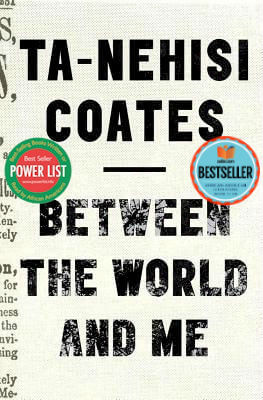Book Review: Between The World And Me
5-time BLK Bestseller, Adult Nonfiction (Hardcover)
Reviewed by:
Kam Williams“In a profound work that pivots from the biggest questions about american history and ideals to the most intimate concerns of a father for his son, Ta-Nehisi Coates offers a powerful new framework for understanding our nation’s history and current crisis.
Americans have built an empire on the idea of ‘race,’ a falsehood that damages us all but falls most heavily on the bodies of black women and men—bodies exploited through slavery and segregation, and, today, threatened, locked up, and and murdered out of all proportion.
What is it like to inhabit a black body and find a way to live within it? And how can we all honestly reckon with this fraught industry, and free ourselves from its burden.
Between the World and Me is Ta-Nehisi Coates’ attempt to answer these questions in a letter to his adolescent son.”
—Excerpted from the book jacket
Ta-Nehisi Coates garnered national attention a year ago when he published
“A Case for Reparations” in the
Atlantic Monthly magazine. Now, the progressive pundit is back with
Between the World and Me an
equally-incendiary assessment of the state of race relations in the United
States.
 The book is basically designed as an open letter from
Ta-Nehisi to his 15 year-old only-child, Samori. The author fears the boy
might suffer the same horrific fate as African-American youngsters like
Trayvon Martin and
Jordan Davis who were killed on a whim by white men for
the “crimes” of walking home while black and listening to loud music,
respectively.
The book is basically designed as an open letter from
Ta-Nehisi to his 15 year-old only-child, Samori. The author fears the boy
might suffer the same horrific fate as African-American youngsters like
Trayvon Martin and
Jordan Davis who were killed on a whim by white men for
the “crimes” of walking home while black and listening to loud music,
respectively.
Ta-Nehisi writes in a free-flowing,
stream-of-consciousness style reminiscent of Allen Ginsberg in the epic poem
“Howl.” However, this relatively-substantial opus is more of a history
lesson than an escapist dirge.
For, whether he’s talking about
dating an East Indian beauty, a classmate with Jew dreadlocks or the woman
he would eventually marry, Ta-Nehisi invariably views every aspect of his
life through the prism of race. As he sees it, skin color narrowly
determines not only one’s treatment but one’s fate in this country, a burden
that is almost too much to bear when it comes to being black.
Taking
no prisoners, the fearless firebrand indicts everything from “democracy” to
“whiteness” to “American exceptionalism” for the plight of his oppressed
people. His hope for Samori is “to have your own life, apart from fear.” But
he believes this nation still has a lot of work to do to arrive at a place
where black lives indeed matter.
What higher praise could Ta-Nehisi
ask for than the blessing of Nobel laureate
Toni Morrison who christens him
as the long-awaited visionary finally filling the intellectual void left in
the wake of the passing of James Baldwin.


